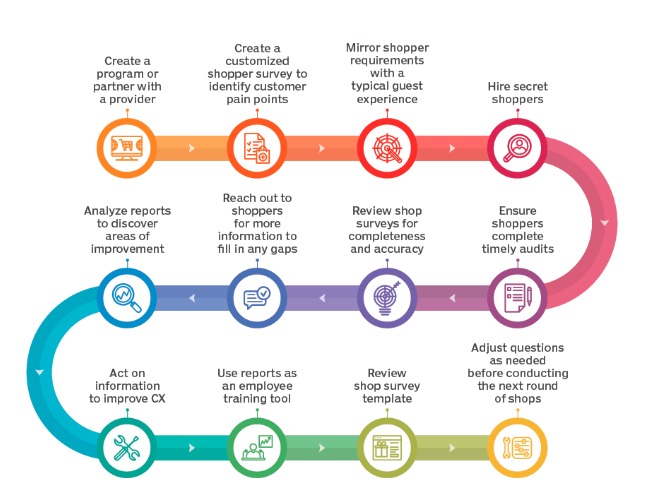Mystery shopping is a powerful tool for businesses to evaluate customer experiences, operational efficiencies, and staff performance. However, the success of a mystery shopping program depends on how effectively it is designed and implemented. A well-crafted program provides actionable insights that help businesses improve service quality and drive customer satisfaction. At Incognito Mystery Shopping Consultancy, we specialize in creating customized programs that deliver measurable results. Here’s a guide on how to design an effective mystery shopping program.
1. Define Clear Objectives
The foundation of an effective mystery shopping program lies in setting clear and specific objectives. Determine what you aim to achieve, such as:
- Evaluating customer service quality.
- Measuring compliance with brand standards.
- Identifying operational inefficiencies.
- Enhancing specific aspects of the customer journey.
Clearly defined goals ensure the program remains focused and delivers actionable results.
2. Identify Key Performance Indicators (KPIs)
Once objectives are established, define the KPIs that will measure success. Examples include:
- Response times for customer inquiries.
- Staff adherence to company protocols.
- Cleanliness and organization of facilities.
- Accuracy of product or service delivery.
These metrics provide a quantifiable way to assess performance and track improvements.
3. Select the Right Mystery Shoppers
Choosing the right mystery shoppers is crucial for accurate evaluations. Look for individuals who:
- Match your target customer profile.
- Possess strong observational and communication skills.
- Understand your industry and customer expectations.
At Incognito Mystery Shopping Consultancy, we maintain a diverse pool of professional evaluators to ensure reliable feedback.
4. Develop Comprehensive Scenarios
Create realistic scenarios that align with your objectives and mimic typical customer interactions. Scenarios should:
- Include specific tasks, such as making a purchase or asking for assistance.
- Test multiple touchpoints, including in-person, online, and over-the-phone interactions.
- Address potential pain points in the customer journey.
Detailed scenarios ensure that mystery shoppers capture meaningful insights.
5. Provide Clear Guidelines
Equip mystery shoppers with clear instructions to ensure consistent evaluations. Guidelines should cover:
- Specific elements to observe and assess.
- How to document findings accurately.
- Confidentiality and ethical considerations.
Comprehensive guidelines minimize discrepancies and enhance the quality of feedback.
6. Use Advanced Tools and Technology
Leverage technology to streamline the mystery shopping process. Tools like mobile apps and analytics platforms can:
- Facilitate real-time data collection.
- Simplify report generation.
- Provide visual insights through dashboards.
Advanced tools improve efficiency and enable faster decision-making.
7. Analyze and Report Findings
An effective mystery shopping program requires thorough analysis of collected data. Reports should:
- Highlight key trends and patterns.
- Include both quantitative metrics and qualitative feedback.
- Provide actionable recommendations for improvement.
At Incognito Mystery Shopping Consultancy, we deliver detailed, easy-to-understand reports tailored to your business needs.
8. Act on the Insights
The true value of a mystery shopping program lies in implementing changes based on the findings. Use the insights to:
- Address identified service gaps.
- Provide targeted training to employees.
- Optimize processes and operations.
Regularly review progress to ensure continuous improvement.
9. Monitor and Refine the Program
Mystery shopping is not a one-time activity. Periodically update and refine the program to:
- Adapt to changing customer expectations.
- Align with new business objectives.
- Ensure ongoing relevance and effectiveness.
Why Choose Incognito Mystery Shopping Consultancy?
At Incognito Mystery Shopping Consultancy, we design and execute mystery shopping programs tailored to your unique business needs. Our approach includes:
- Custom scenarios that reflect real-world interactions.
- Professional mystery shoppers with industry expertise.
- Comprehensive reports with actionable insights.
- Ongoing support to help you achieve long-term success.
Conclusion
Designing an effective mystery shopping program requires careful planning, clear objectives, and a commitment to acting on insights. By following these steps, businesses can gain valuable feedback, improve customer experiences, and drive growth. Ready to create a mystery shopping program that delivers results? Contact Incognito Mystery Shopping Consultancy today to get started.

